Facebook Ads (Meta Ads)
Learn how to seamlessly integrate AnyTrack with the Facebook Conversion API to measure, optimize, and report your Facebook Ads performance effectively, boosting your ROAS.
AnyTrack provides a powerful solution that seamlessly connects your website or shop with Facebook, enabling you to fully leverage Facebook's advanced advertising features. As a Facebook Business Partner, AnyTrack simplifies the integration process—no coding or technical expertise required. This allows you to enhance key metrics like Return on Ad Spend (ROAS), Event Match Quality, and attribution while providing real-time insights and optimization tools.
TL;DRThis article covers everything you need to know about integrating AnyTrack with Facebook Ads, including:
- Setup & Connection: How to easily connect your website or shop with Facebook Ads through AnyTrack without any coding required.
- Conversion Tracking & Mapping: How AnyTrack tracks conversions, handles data mapping, and ensures measurement accuracy.
- Data Orchestration: How to optimize ad spend, create custom audiences, and access comprehensive campaign reports.
- Prerequisites for Integration: What you need to have in place before starting the Facebook Ads integration in AnyTrack.
- Step-by-Step Integration Guide: Simple steps to connect Facebook Ads to AnyTrack, enable server-side tracking, and verify the connection.
- Verification and UTM Tracking: How to verify your ads and install the UTM Tracking Template for precise conversion tracking.
If you're ready to get started, you can skip ahead to the How to Set Up Facebook Ads in AnyTrack section.
Facebook Ads Integration Features
Main Features
Ads Reporting & Campaign Sync
Access real-time campaign performance data directly in AnyTrack. Sync your Facebook Ads data for comprehensive reporting across all your marketing channels.
- Unified reporting dashboard
- Real-time campaign metrics
- Cross-channel attribution
- Performance analytics
Conversion API (CAPI)
Server-side connection to Facebook's Conversion API for accurate, reliable conversion tracking that bypasses browser limitations and ad blockers.
- Server-to-server tracking
- Enhanced measurement accuracy
- Improved Event Match Quality
- Privacy-compliant data delivery
Lead Ads & CAPI for CRM
Track Meta Lead Ads with Instant Forms and send CRM conversions to Facebook CAPI to close the conversion loop from lead capture to final purchase.
- Lead Ads campaign tracking
- CRM conversion forwarding
- Complete customer journey visibility
- Offline conversion tracking
Tag Management
AnyTrack automatically loads and manages your Facebook Pixel, ensuring proper initialization and complete event data capture without manual code implementation.
- Automatic pixel loading
- No-code implementation
- Proper pixel initialization
- Centralized tag management
Configuration & Management
Connect Multiple Ad Accounts
Connect multiple Facebook Ad accounts to a single AnyTrack property for consolidated reporting and management across all your advertising efforts.
- Multi-account support
- Centralized management
- Consolidated reporting
- Flexible account switching
UTM Parameter Template
Use AnyTrack's recommended UTM tracking template with dynamic parameters for precise attribution and campaign tracking across all your Facebook Ads.
- Dynamic parameter insertion
- Standard + custom parameters
- Automated campaign tagging
- Bulk template application
Event Mapping
Map your website or platform events to Facebook's standard events or create custom event mappings directly from the AnyTrack dashboard.
- Standard event mapping
- Custom event support
- Visual mapping interface
- Event preview and testing
Custom Conversions
Create custom conversions directly from the AnyTrack dashboard to track business-specific goals without additional code.
- No-code custom conversions
- Rule-based conversion creation
- Advanced filtering options
- Direct API integration
Validation & Testing Tools
Verify Ads Setup
Automatically verify that your UTM tracking template is correctly installed across all your Facebook campaigns with visual status indicators.
- Red/yellow/green status marks
- Campaign-level verification
- Error detection and guidance
- Bulk verification tool
Event Match Quality Dashboard
Monitor and optimize your Event Match Quality scores to improve attribution accuracy and ad performance.
- Real-time EMQ monitoring
- Score improvement suggestions
- Parameter completeness tracking
- Data quality insights
Test Mode
View conversion data sent to Facebook in real-time to verify your integration is working correctly before going live.
- Real-time event preview
- Test event validation
- Debug mode visibility
- Pre-launch verification
How AnyTrack Works with Facebook Ads
Here's a simplified explanation of how AnyTrack seamlessly integrates with Facebook Ads to optimize your campaigns:
1. Visitor Interaction
When visitors land on your website, the AnyTrack Tracking Tag activates:
- Automatically loads the Facebook Pixel (if not already present)
- Collects essential data points (UTM parameters, referrer data,
clickidvalues) - Gathers first-party data (cookies and session IDs)
- Activates AutoTag on trackable elements (carts, product links, forms)
2. Event Tracking
When visitors engage with your content, AnyTrack automatically tracks:
- Key events:
AddToCart,OutboundClick,FormSubmit - Advanced Integration: Tags forms, links, and carts with tracking parameters
- Platform-specific tracking for Shopify, ClickFunnels, WooCommerce
3. Event Processing
Tracked events are processed in real-time:
- Deduplication & Normalization based on Facebook's requirements
- Event Mapping to Facebook's standard events
- Event Attributes mapped to match Facebook's expectations
4. Real-Time Reporting
Data Stream and Analysis:
- Real-time tracking data available across AnyTrack dashboard
- Comprehensive reports combining multiple data sources
- Instant insights into campaign performance
How to Set Up Facebook Ads in AnyTrack (in 5 minutes)
Before you begin, ensure you have:
- An AnyTrack Property: Ensure you have an active property set up in AnyTrack. A Property acts as the connection point between your website or shop and AnyTrack. Learn how to create a new property.
- A Connected Conversion Source: Ensure you have a connected conversion source from our Integration Catalog to receive the conversions that will be sent to the Facebook Conversions API.
- Access to Facebook Business Manager: You need access to Facebook Business Manager with the appropriate permissions to manage your Facebook Ads account and connect it to AnyTrack.
Step 1: Connect Your Facebook Ads Account
The first step in integrating Facebook Ads with AnyTrack is to connect your accounts, allowing automatic syncing of campaign data and conversions through the Conversion API. No coding needed! Here's how:
- Log in to your AnyTrack account, navigate to Tracking Pixels, and click on Connect Pixel
- Follow the prompts to connect your Facebook Ads account to AnyTrack
- Enable server-to-server tracking
- Save your changes
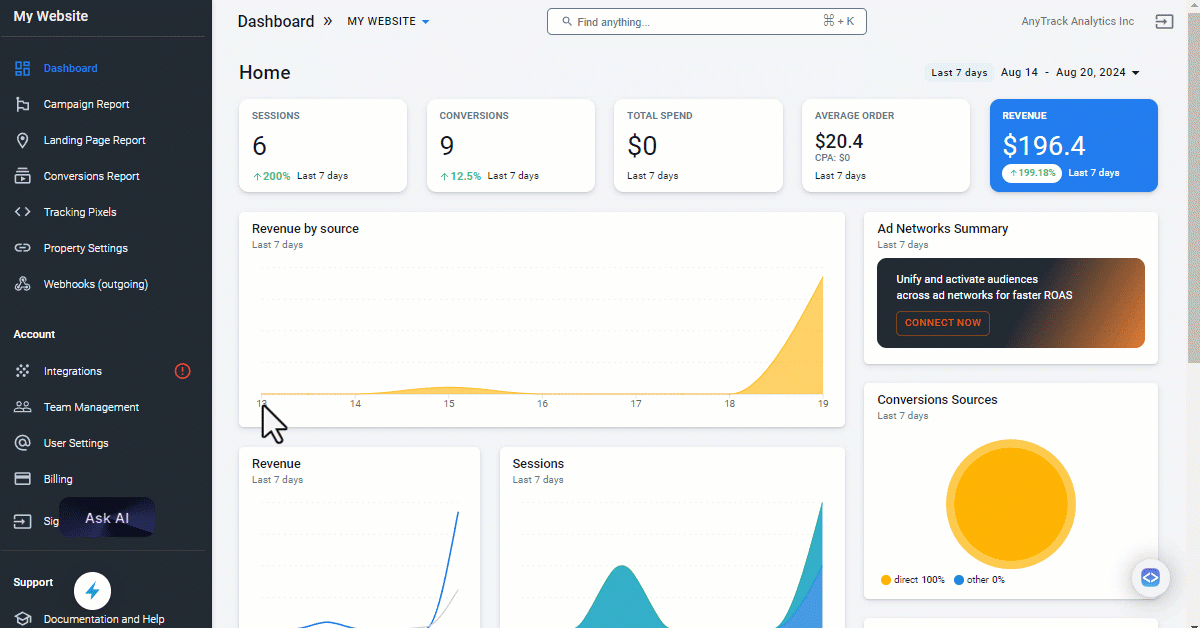
Connect your website to the Facebook Conversion API in seconds.
Enable Server-to-Server TrackingMake sure to enable the server-to-server tracking slider to send your conversion events through a secure connection to the Facebook Conversion API. No code needed!
Step 2: Install the UTM Tracking Template
The UTM Parameters Template is a crucial component of the Facebook Ads integration. It allows AnyTrack to accurately identify and attribute conversions to the correct Facebook Ad. Here's how to install it:
- Select the connected pixel in the Tracking Pixels section, click the Ads Integration tab, and copy the UTM Tracking Template
- Log in to your Meta Ads Manager and navigate to the campaign level
- Access the option to add URL parameters
- Paste the tracking template. It includes all necessary parameters, such as ad set name, ad ID, and campaign ID
- Proceed to verify your ads
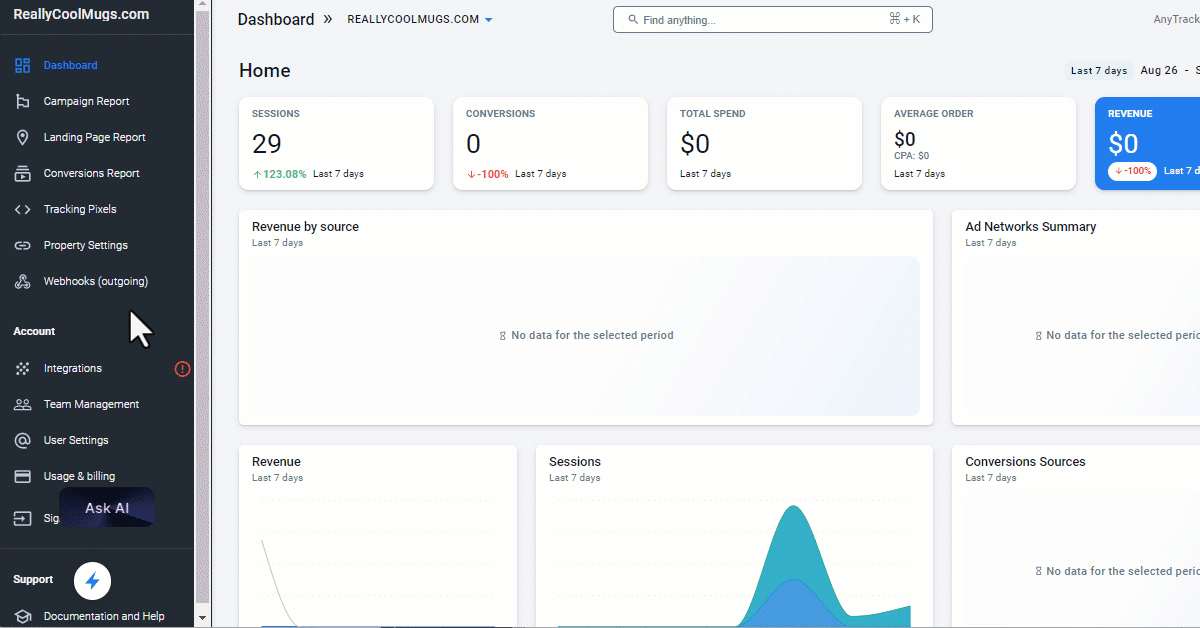
Install the recommended UTM Tracking Template in Meta Ads Manager.
Step 3: Verify Your Ads
Once you've connected Facebook Ads to AnyTrack and installed the UTM Tracking Template, it's important to verify that your ads are properly configured. Here's how:
- Navigate to the Tracking Pixels section and select the Facebook Pixel associated with your campaigns
- Click the Ads Integration tab
- Click the Verify Ads Settings button. If the template is correctly installed, you will see a green mark 🟢 next to your campaigns
Campaigns With Conversion Events OnlyThe Verify Ads Settings feature only shows campaigns with conversion events as the campaign objectives. Learn more.
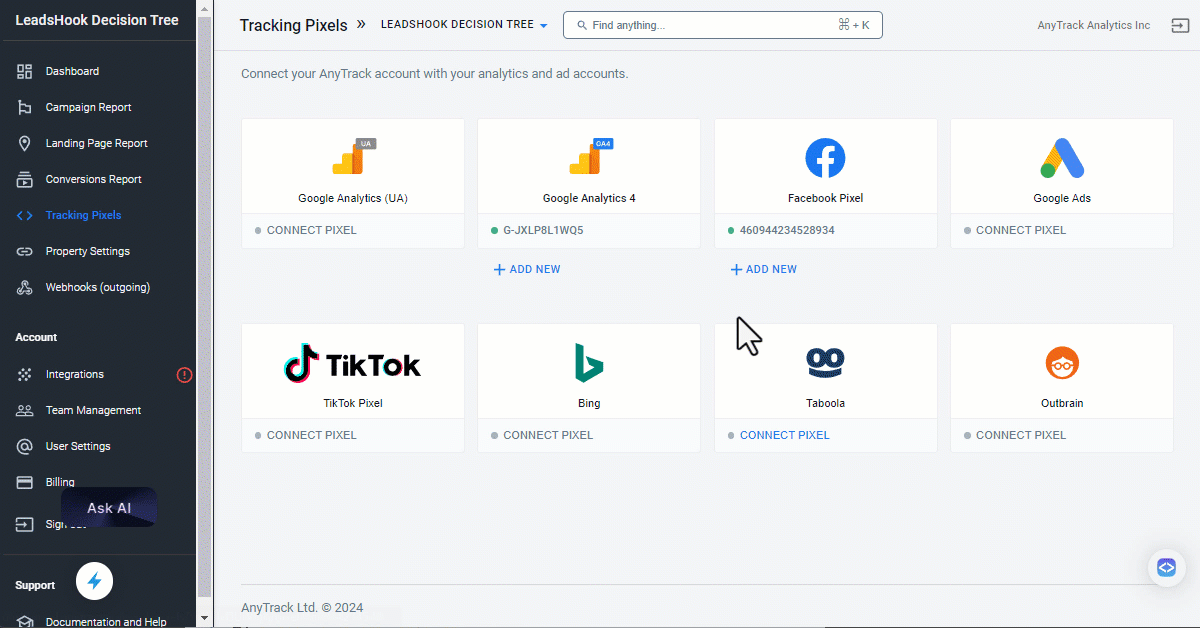
Easily verify if your ads have the correct UTM tracking template.
A red mark indicates that the template was not found, while a yellow mark signals that a tracking template is present but contains errors. Click to drill down on the cause of the warning.
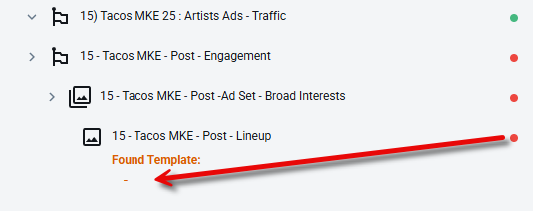
Click the ads to drill down on the cause of the warning.
Supplementary Video TutorialPrefer a video? Check out this quick tutorial on how to connect your Facebook Pixel and Conversion API to AnyTrack.
Validate Your Facebook Integration
Once installed, the UTM template allows AnyTrack to track every visitor's journey from the Facebook ad click to conversion, providing detailed insights into your campaign's performance.
Important Timing Information
Before being concerned about seeing or not seeing data, please keep the following in mind:
AnyTrack sends conversions in real-time to the Facebook API, but conversions are displayed in Facebook with the following delays:
- Event Manager: Approximately 10-20 minutes delay. Check the Overview section:
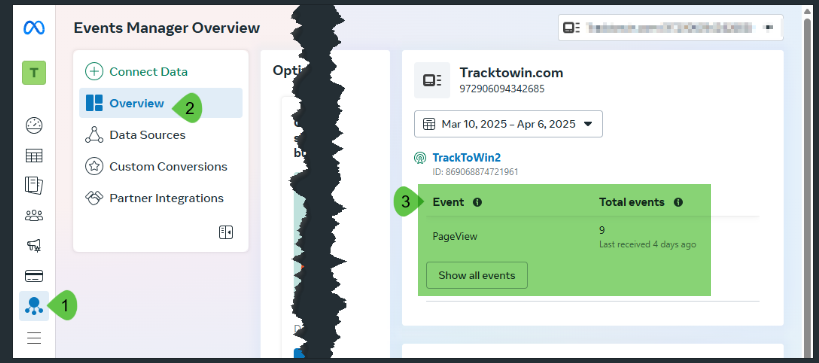
- Ads Manager: Officially up to 72 hours, but usually within hours.
Warnings: It's normal to receive some warnings when you first implement the integration, as Facebook adjusts to the new data format. However, persistent warnings may indicate optimization opportunities or configuration issues. See our Troubleshooting Guide to understand which warnings you can safely ignore and which require action.
Validation Checklist
- Check that you've connected the correct pixel ID.
- Check that you've connected your ad account.
- Check that you've enabled the Facebook Conversion API.
- If you've updated the Event Mapping, verify that the events are being recorded in the Event Manager.
- You've added the Facebook UTM Tracking template to all your ads.
- Check that you've selected the correct pixel and optimization event in your campaigns.
- Check the Facebook Event Manager to ensure you don't see any Browser Events.
Cross-Platform Integration
Other Ad Platforms
Expand Your Reach: AnyTrack supports multiple advertising platforms beyond Facebook. Set up unified tracking across:
- Google Ads - Track Google's conversion data with enhanced attribution
- TikTok Ads - Leverage TikTok's growing advertising platform
- Microsoft Ads - Reach Bing's search audience effectively
- Taboola - Native advertising with precise tracking
E-commerce Integration
Connect Your Store: Seamlessly integrate your e-commerce platform for complete conversion tracking:
- Shopify Integration - Native plugin for automatic order tracking
- WooCommerce Integration - WordPress e-commerce tracking
- ClickFunnels Integration - Funnel-based conversion tracking
- Browse our complete Integration Catalog for more platforms
Facebook Ads Integration FAQ
Facebook Ads Integration FAQ
Next Steps
Updated 1 day ago
